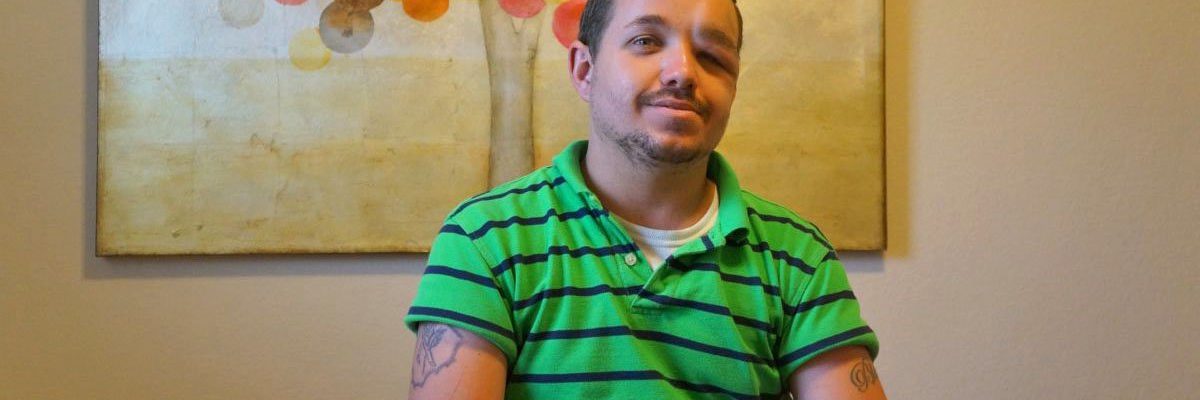Two months of living on the streets in the dead of winter was taking its toll on Chase….
He was famished, alone and had fallen ill with pneumonia. He felt like he hit rock bottom when he called his sister with one request, “Come find me, and bring a loaf of bread so I can eat.”
If you met this 19-year-old today, it would be difficult to imagine him in such dire straits. Chase is energetic, confident and hopeful about his future. It is no exaggeration, he says, that his journey to BCFS Health and Human Services’ (BCFS HHS) Abilene Transition Center and Our House completely turned his life around.
Chase moved in and out of foster care his whole life. He ran with the wrong crowd and turned to a life of crime to help support his younger sister.
“My dad beat me when I was growing up, and when I decided to leave home he turned his attention to my sister and hurt her,” Chase said. “So I came back home and got beat so my sister wouldn’t get hurt. I started selling drugs so I had money to buy her food, clothes, and whatever she needed.”
When Chase aged out of foster care at 18, he moved into a transitional group home for youth. This respite was short-lived, however, and he was kicked out of the home for abusing drugs and alcohol. He moved in with a girl he was dating, but found himself homeless again when she ended their relationship to be with another man.
So Chase began his two month-stretch of life on the streets. He spent his days applying for jobs around town, but to no avail.
“On applications that asked for my address I’d write ‘homeless,’ and that played a big part in me not getting call-backs because they saw me as unreliable,” Chase recalled. “After a couple weeks, I gave up looking for jobs. I wanted to go back to selling drugs, but I didn’t. After I got sick I couldn’t do it anymore.”
At this crossroad in his life, he chose to seek help rather than return to a life of crime and instability.
Doors Open at “Our House”
BCFS HHS’ “Our House” is a transitional living home for young men in the Abilene, Texas region struggling with homelessness. According to the National Alliance to End Homelessness, teens and young adults who lack a stable roof over their heads are at a heightened risk for physical abuse, sexual exploitation, mental health disabilities, chemical or alcohol dependency, and death. Those in rural communities face even greater hurdles due to limited or underfunded social service options, inadequate personal or public transportation options, lack of affordable housing options, and high rates of poverty and unemployment.
Nationally, there are few or no shelters for those struggling with homelessness in rural communities. In the Abilene area, there are no shelters specifically for young men. Because of the struggles they have faced in foster care or as a result of other traumas, it is critical that this impressionable population has a safe place just for them.
Chase was a good fit for Our House and was quickly able to capitalize on its direct pipeline into critical wraparound services offered through BCFS HHS’ Abilene Transition Center. At the transition center, young adults who are struggling receive services like case-management, assistance completing secondary education, applying for college, locating stable employment, and independent living skills. Such support empowers and enables young adults to break the cycle of homelessness and become successful and independent law-abiding citizens.
“When I moved into Our House, they told me I had to get a job, pay rent, or be in school,” Chase said. “The day after I moved in, I got an interview at Taco Bell and went to work the very next day. A few weeks later I got my second job at Teleperformance.”
With stable housing and two jobs, doors were opening for Chase. The one challenge he still faced, though, was that he had no transportation. BCFS HHS staff tried to give him a bicycle to ride to work, but he refused to accept the gift. He insisted on buying the bicycle from them. For several weeks, Chase walked seven miles to work while he earned enough money to pay for the bike. This was the first of many times Chase demonstrated he didn’t have a sense of entitlement.
“I don’t want things just handed to me,” Chase said. “I’d rather do things for myself, make my own mistakes, and fix things if I need to. I feel like if I have things done for me, it might not work out.”
A New Purpose
Before coming to BCFS HHS, Chase had never been to a movie theater or gone fishing. He experienced both for the first time on trips organized by the transition center. BCFS HHS promotes positive outlets to youth as a way of steering them away from risky behaviors and bad decisions. One of Chase’s favorite memories of the last few tumultuous years is the gorgeous summer day that BCFS HHS’ Johnny Nguyen let him drive his small fishing boat out to catch his very first fish.
Chase and the other residents of Our House share in communal responsibilities, from cleaning and cooking meals to service projects benefiting the neighborhood.
“This instills a sense of resident responsibility and ownership in Our House,” Johnny explains. “Our goal is to help the young men better manage their finances, health and hygiene, and develop adult social skills to become independent, responsible and contributing adult members of the community.”
Just a few months after hitting rock bottom, Chase’s future looks bright and his dreams are ambitious. He plans to study criminal law in college and become a Texas Ranger, and be a motivational speaker “on the side.” He is grateful for the life-changing services he received at Our House and the transition center, that he is inspired to pay it forward.
“When I retire, I’ll buy some property and lend it out to a place like the transition center, and let them fill it with kids who need help – kids like me.”


